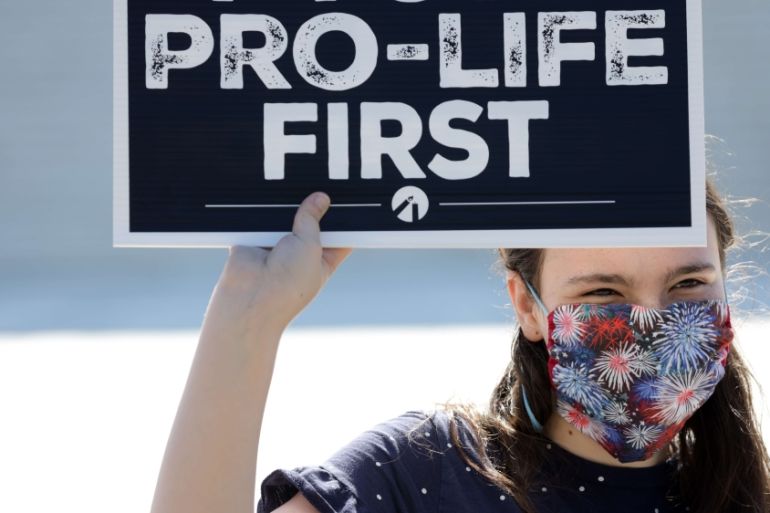Why ‘pro-life’ activists won’t protect women during childbirth
By not trying to improve childbirth conditions, ultra-conservatives reveal that their true interests lie elsewhere.

Around the world, from the United States to Ukraine, there is no shortage of powerful ultra-conservative groups and leaders who want women to bear as many babies as they physically can. They vehemently oppose contraception as well as safe, legal abortion. Motherhood is extolled as the pinnacle of human achievement for women.
Last year in Verona, Italy, many of these groups converged at the World Congress of Families summit of ultra-conservative activists and their far-right political allies. Like other speakers, Eduard Habsburg-Lothringen, a member of one of Europe’s oldest royal families, introduced himself by announcing how many children he has fathered (six).
Keep reading
list of 4 itemsMexico’s teachers seek relief from pandemic-era spike in school robberies
‘A bad chapter’: Tracing the origins of Ecuador’s rise in gang violence
Why is the US economy so resilient?
You would think, given their power and obsession with motherhood, these groups would have successfully campaigned to ensure childbirth is a safe and positive experience for women. Instead, they have paradoxically left campaigns against obstetric violence to the feminists and global health experts that they also vehemently oppose.
Even before COVID-19, too many women endured unacceptable dangers and mistreatment giving birth. The pandemic appears to have made this much worse. Since March, women in at least 45 countries have faced childbirth experiences during the pandemic that defy international guidelines as well as national laws and policies.
In countries around the world, women have been forcibly separated from newborns; required to give birth “alone” without support from partners or relatives; denied pain medication. They have been shouted at and treated “like machines”. At some hospitals, all women have been subjected to “mandatory” caesarean sections.
These incidents have occurred even in places which are hotspots for ultra-conservative movements, and where they have national political power or influence. “No woman should be treated how I was treated during childbirth,” said one new mother in the US, where these groups have celebrated President Donald Trump’s “pro-life” administration.
“My husband and I will handcuff ourselves together if doctors won’t allow him in,” said a woman in Ukraine, where the president encouraged people to use the lockdown to have more babies. Here, as in Armenia, restrictions on women giving birth have even outlasted lockdowns. You can take your partner to a restaurant but not a maternity ward.
Globally, “pro-life” and “pro-family” movements have not slowed down during COVID-19. They have been busy campaigning – but not to protect the rights of pregnant women and new mothers. Their focus has been on limiting women’s choices.
In the US, for example, conservative states moved quickly to “ban” abortions by classifying them as non-essential services. Last week, the Supreme Court upheld Trump administration rules allowing employers to opt out of including birth control in an employee’s health insurance plan.
The United Nations warned that COVID-19 restrictions and lockdown disruptions could result in seven million unintended pregnancies in just six months. For a heartbreaking number of women, they have had no choice but to continue these pregnancies or seek unsafe abortions.
Those who have arrived at maternity wards to give birth during the pandemic have faced other restrictions that top doctors and lawyers denounced as “unnecessary” and part of an “alarming pattern of women’s health and rights being deprioritised”.
Motherhood-obsessed ultra-conservatives have the power, and you would think the motivation, to do something about this. But instead, many of these same movements have attacked the World Health Organization (WHO) – the global health body that is standing up for women’s rights to timely, quality and respectful care in childbirth.
A week after the pandemic was declared, the WHO even issued specific guidance on childbirth during COVID-19 – insisting, among other things, that women giving birth be treated with respect and dignity; be allowed birth companions, and; be supported to breastfeed and have skin-to-skin contact with newborns. (Yes, this is the same WHO that the “most pro-life president” Donald Trump has sought to savagely defund.)
By not using their power to make a difference for women in childbirth, ultra-conservatives reveal how their interests actually lie elsewhere – in promoting and defending childbirth as “women’s work”, something that we must do in patriarchal societies, and that we should not “complain” about. This is bad news for women’s rights, certainly – but it is also, ultimately, a losing strategy for these groups.
Eventually, ultra-conservatives’ silence on these issues will undermine their efforts to expand. Many of the people that these movements are trying to reach will share feminists’ concerns about these issues, and want these conditions for women giving birth to be better. Once again, this pandemic should teach us we have more in common than we do not – and help us protect women’s rights and lives.
“I honestly hope,” said one woman in Italy, that those in power “will learn something from our suffering and prevent other women from going through that we had to go through”. She gave birth in late March – shortly after one of the co-hosts of last year’s ultra-conservative summit in Verona called for people to use the COVID-19 lockdown to reproduce, exclaiming: “Let’s stay at home and have a baby!”
Like many women around the world, she had to go through childbirth “alone” with her partner banned from the hospital she went to. She was also separated from her newborn for more than six hours after birth. Feminists and global health experts are listening to these stories and calling for change. Will ultra-conservatives join them?
The views expressed in this article are the author’s own and do not necessarily reflect Al Jazeera’s editorial stance.